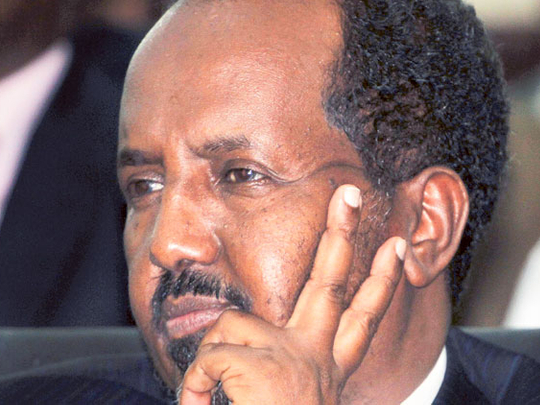
Dubai: World leaders congratulated Somalia’s Hassan Shaikh Mohmoud on Tuesday on his election as president and pledged their continued support to the country.
UAE President His Highness Shaikh Khalifa Bin Zayed Al Nahyan has sent a congratulatory cable to Hassan on winning the election.
His Highness Shaikh Mohammad Bin Rashid Al Maktoum, Vice-President and Prime Minister of the UAE and Ruler of Dubai, also dispatched a similar cable to the Somali President.
Meanwhile, General Shaikh Mohammad Bin Zayed Al Nahyan, Crown Prince of Abu Dhabi and Deputy Supreme Commander of the UAE Armed Forces, also sent a congratulatory cable to Hassan.
UN Secretary General Ban Ki-moon said Hassan should quickly take steps to launch a peace-building process in the East African country.
Ban, who was on a visit to Switzerland, congratulated Hassan for being voted into office by parliament on Monday, the first time a Somali president has been elected in the troubled country since the 1980s.
“The secretary general encourages the new president to move expeditiously, to appoint an inclusive, accountable government that can begin the work of peace-building in the country,” Ban’s spokesman Martin Nesirky said.
EU foreign policy chief Catherine Ashton called Hassan and told him he had “a strong mandate to establish a new government that can rebuild the country and that he should take advantage of the impetus that comes with the end of the transition process”.
“We pledge our support to the new democratic institutions,” she said.
Lawmakers chose Hassan as president after the 56-year-old lecturer defeated Sharif in a run-off.
British Prime Minister David Cameron hailed as a “significant moment” Somalia’s election of Hassan but warned the country faced a long road to democracy.
“This is a significant moment for Somalia, and an important step towards a renewed political process,” Cameron said in a statement.
The British prime minister praised the role played by outgoing president Sharif Shaikh Ahmad in stabilising Somalia and urged the new incumbent to build on his work.
The surprise election of Hassan may usher in a new era for the war-torn nation, analysts said Tuesday, warning that the new leader faces multiple challenges.
“We’ve definitely seen a vote by the parliamentarians for a change of direction,” Ahmad Soliman, Horn of Africa researcher at Chatham House, said.
Hassan, an academic and activist, won 190 votes against 79 for the outgoing president Sharif Shaikh Ahmad, who had been seen as the favourite.
J Peter Pham of the Washington-based Atlantic Council noted that “by all accounts the newly chosen president of the so-called government of Somalia is an admirable individual who is well-known and respected by local and international non-governmental organisations”.
But he warned “one must avoid the temptation - already succumbed to by some stakeholders - of allowing enthusiasm of the moment to cloud the realities of what actually happened.”
“The parliamentarians did not so much vote for Hassan as against the incompetence and corruption of Sharif Shaikh Ahmad,” he said, adding that the lawmakers who voted “were hardly legitimate representatives of the Somali people.”
“The MPs didn’t want another four or five years of Sharif and it’s been very clearly displayed by 70 per cent of votes going to the new president,” Chatham House’s Soliman agreed.
Sharif, who had seemed confident of re-election, was dogged by allegations of corruption during his tenure.
Soliman said it was too early to say whether the new president will be able to consolidate his position with the parliamentarians “and move forward and build a cabinet.”
Pham said Hassan will be presiding over “an entity more known for stealing foreign aid than using it for the good of the Somali people”.
“While the new president may well want to change this, he will have to fight power interests, both old (the functionaries who have carved power bases for themselves) and new (people who spent tens of thousands of dollars last month to become parliamentarians will want to recover their investments).”
For Abdirashid Hashi, an analyst with International Crisis Group in Nairobi, the new president’s resounding victory was also “a protest vote” against Sharif.
Hassan “is very passionate about Somalia,” Hashi said.
“He has a good feel for what’s going on on the ground,” he said.
A vendor on the streets of the capital echoed that sentiment.
“The new president is a person with credibility. He has been in the country without fleeing in the past 22 years,” Hassan Abdi said, noting that the new president had not “come with a laptop like those from the diaspora”.
Hashi stressed however that the new president faced a daunting task.
“There is some optimism about him but he has to gain lots of support” notably that of the international community and “there are huge challenges in front of him,” he said.
Pham said one handicap could be that the new leader “does not appear to have a force behind him, military or political. Thus he is weak in comparison to the real power brokers in Somalia.”












